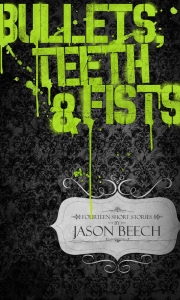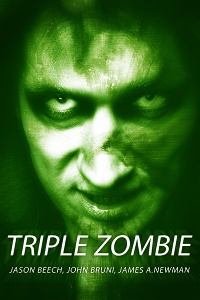The half way line divided us for the last few seconds before kick-off. We all danced from foot-to-foot to keep our blood warm from the icy wind and the occasional machine gun-fire of hailstones. The prison walls reached for the grey skies and hemmed us in. Ian Ayris, in our red and white, rubbed the Saturn rings on his neck and called heads. Big Barry, turfed from the same quarry as the prison walls, sneered as tails glinted in a flash of the sun.
Ian jogged towards me, laid a hand on my shoulder. “You want answers, then we better win this game. We lose, I double my debt and lose some floppy body parts.”
“Don’t worry. We take out Dan and that’s their chance gone.”
The referee, a nervous prison guard, blew his whistle and the annual prison match kicked off. Big Barry, his belly stretching the seams on his blue shirt, set the tone with a bone-rattle tackle on our number nine. We couldn’t pass to him for about ten minutes until he got his nerves back under control. We passed and moved. Ayris performed a double-scissor down the right and invited some enraged knee-high tackles. He managed to burst past and whip in a cross. Our nine headed home and ran for his life. 1-0 up and Ayris’ frozen face filled with hopeful colour.
The blues hoofed the ball up the field like the back garden donkeys they are. We created diamonds, squares and pyramids all over the field, but we lost our number four to a bollock-high tackle and in came a man more suited to stamp collecting.
The Blues’ Dan had his first proper run. He beat two of us, nutmegged another, and slotted it home in the far corner. 1-1.
Ayris showed me his palms. Stop Dan.
Ayris caused them trouble again. Not for long. Big Barry charged. Wanted to add a few satellites to the Saturn rings he’d wrung round Ian’s neck. He slid in, two feet in the air, and missed – but he got the ball.
“Ref, dangerous play for God’s sake.”
The ref shrugged his shoulders and ran to the centre circle to escape responsibility. Dan took control and skipped a challenge. Beat another with a a step over and slammed it into the top corner. 2-1.
Ayris eyed the prison gate for some escape. No way, not without my answers, fella. Dan got the ball again. He hummed Garth Brooks in the showers. He liked MK Dons. He laughed at Adam Sandler films. I drove through him like a hot knife through butter and that was the end of his game.
Ayris patted me on the shoulder with a grin. Sadistic bastard. Big Barry took the ball and shouldered Ayris from his challenge. He snaked the ball through a defender and Maradona’d past another before splitting our centre-backs. What the …? 3-1 down. Oh shit. Never mind Ayris’ limbs, I wouldn’t get my answers at this rate.
At half-time we talked of escaping over the prison wall. We could blend in with the civilians and get away with it, but Ayris turned all Michael Caine and demanded honour in a fight back.
The hoofers hoofed for the Blues, but Big Barry showed silky touches and moves I could never have imagined he had in him. I went in for a shoulder barge but I might as well have challenged the Empire State Building. I had another go once I got my wind back. Ayris recognised the danger to his bones at the coming final whistle and went for a mazy run to get the game back, but they counter-attacked and belted it past our weak-wristed goalie. 4-1 down with a minute to go.
We had no Hollywood ending in sight and when the Blues had the ball in our penalty area again I had no choice but to scythe that big mother trucker, Barry, down with a knee-high, two-footed bone breaker. Big Barry burst red and collapsed, all soprano. Before the ref or the prison guards located the howl’s source further back up the field, Ayris followed through with a bollock-stamp which made a eunuch of the big fella.
Fists flew, and the field turned into a painter’s palette as blues smashed red and whites, and red and whites head-butted blues. The prison guards charged and slipped and fought to gain control while Ayris headed for the unguarded gate. I’d have followed but a guard rugby tackled me into the dirt. I thrust a hand out as Ayris neared the exit. The prison guard worked to still my wriggle but Ayris had almost made it to freedom. The guard’s whistle hung from his neck. I winced at the guard’s spit and blew that thing shrill. Fists hung still in the air. Heads rested under armpits. The guards turned to Ayris, who had flattened against the wall. His red and white stripes hid nothing.
I would have my answers.
Ian Ayris writes gritty British fiction and characters with vast emotional punch. His One Day in the Life of Jason Dean is a masterpiece, about a debt collector whose job grates against his love for classical music and philosophers. His John Sissons series of books, Abide with Me and April Skies are highly rated, and his short works are major lights across a ton of anthologies.
A friend of mine doesn’t read fiction, paraphrasing Frank Skinner about it all being made-up and he has no time for any of that. What words do you have for such a philistine?
Ian Ayris (IA): I’m not sure there’s much of a difference between fiction and non-fiction, to be honest. All life is a story. If it isn’t, what else is it?
What must a protagonist have to make you read on?
IA: The reader must feel as if the protagonist is a real, vital presence in the very room they are reading about them, leaning over their shoulder, breathing on the side of their face. The protagonist must feel real.

Do you need a likeable protagonist?
IA: A protagonist doesn’t have to be likeable, but they must be interesting. The reader must be interested in their fate. Nothing else.
Name a great antagonist, in a novel or movie, and what they do for you.
IA: Ivan Denisovich Shukhov, from One Day in the Life of Ivan Denisovich by Alexander Solzhenitsyn, is one of my favourites. The book follows Shukhov through a single day in a Russian labour camp. Shukhov is experienced by the reader through the minutiae of his day, the surviving of each moment, the monotony, the desperate starvation, the bitter cold. When I read One Day it reminds me that, in life, surviving a difficult time is sometimes the best you can do. It is impossible, for me at least, to walk in Shukhov’s shoes and not be more grateful for the life, and the love, I have.

What makes you throw a book out the window?
IA: Exclamation marks (not including within dialogue). Bloody things. Grrr …
Do you grit your teeth all the way to the end of a dodgy novel?
IA: I try. If only to discover what it is I don’t like. For a writer, bad novels can be just as educative as good ones.
What gets you writing? A great novel? Something you saw on the street or on TV? Something else?
IA: I find it really difficult to just sit down and write. I have to wait until I hear the faint stirrings of whatever particular disembodied voice is whispering in the dark corners of my mind, that has come forth to tell me their story. Then I just listen, and write down what I hear. A process closer to channeling than writing, I suppose.
What did you learn about writing from the last book you wrote?
IA: How difficult it is to write a sequel. Writing for readers that have read the first book, and readers that haven’t – giving enough backstory pointers to the new readers to orientate them within the world of the novel, but not too much that would seem repetitive to the older readers, was an absolute nightmare. Never again, I thought . . . before I started writing the third in the series. And that, how hard that is, I have no words . . .

What’s your next book, in 30 words or less?
IA: Hurt is the third book in the John Sissons series, following John as he negotiates relationships, social issues, strained friendships, blackmail, and a face from the past determined to bring him down.
Where can readers connect with you?
IA: I’m on Facebook at: https://www.facebook.com/ian.ayris
Twitter: @ianayris
Blog: https://www.ianayris.co.uk
Email: ianayris@hotmail.co.uk
You can buy Ian Ayris’ books at Amazon US and UK
Thanks, Ian.
You can BUY City of Forts for a special pre-order price HERE.



